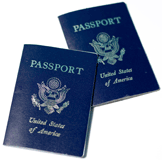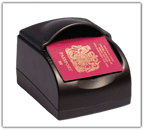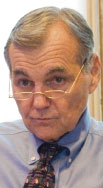U.S. delays bid decision and launch of new contactless and biometric passports
01 March, 2005
category: Biometrics, Government, Library
 By Chris Corum, Executive Editor
By Chris Corum, Executive Editor
Unless you have been living under a rock for the past 12 months, you have certainly heard discussion, debate, rhetoric, and/or fear mongering related to the new U.S. passport technology. The topic has been widely debated in technology and civil libertarian circles and the press has not foregone the opportunity to make the most of the controversy. But at the root of the issue is a very significant decision being made at the federal level – a decision with interwoven technical, personal privacy, and security implications. The decision as to which chip solutions to incorporate into the more than 7-million passports issued in the U.S. each year.
To the layperson, the differences between the vendor offerings currently under evaluation by the Department of State Bureau of Consular Affairs and the Government Printing Office (GPO) seem insignificant. Because of international requirements for Machine Readable Travel Documents (MRTDs) specified by the International Civil Aviation Organization (ICAO) and further strengthened in the U.S. requirements documents, only high-end, arguably state-of-the-art, contactless chips are eligible. The real differences come in more subtle areas such as packaging of the chip and antenna, adherence of it within the passport book, durability of the finished product, interoperability, and tamper/fraud resistance.
The “RFP for Electronic Passport, GPO-EP2004” was released in July 2004. In October 2004, five teams were selected from the pool of responses to the GPO-issued bid:
- Axalto, Inc. – 2 separate awards
- BearingPoint/SuperCom, Inc.
- Infineon Technologies, North America
- SuperCom, Inc.
The dollar figures for these original trials were insignificant, ranging from just $73,787 to $108,317, to cover supplied product samples and effort required for evaluation. These products provided by the five project teams were imbedded into passport books by the GPO and then passed on to a team at the National Institute for Standards and Technology (NIST) for testing. According a GPO representative, NIST’s role is to “test the electronic passports for their ability to meet durability, security, and electronic requirements.”
Following the announcement of the five trial projects, a protest was filed with the Government Accountability Office by one of the bidders that did not receive an initial award. Contactless technology vendor OTI America later withdrew their protest when the GPO agreed to expand the list of awards to include OTI and three other projects.
In a statement from the GPO, Clarence Jellen, General Manager, Security and Intelligent Documents, stated:
“…the goal of the State Department and the GPO is to provide Americans with the best passport in the world. To that end we are actively testing electronic passports that embrace a wide range of technologies … We are expanding the pool of products to test before making an official decision on which products to use.”
That brought the list to nine project teams receiving “try-outs” for the U.S. passport program.
The new awardees were:
- ASK Contactless Technologies, Inc.
- Electronic Data Systems Corp.
- Oberthur Card Systems
- OTI America Inc.
Originally, the rollout was scheduled to begin in February 2005 and be complete by the end of the calendar year. But, according to representatives from the Department of State, the process for obtaining sample chips (from the new awardees) and conducting evaluations will not be completed in time to meet the February launch. The initial launch is now expected to begin sometime this summer with targeted completion in mid-2006.
Impacts on the US-VISIT program?
The delays in the U.S. passport revisions call into question the U.S.-imposed mandate that other countries add contactless chips and biometric to their MRTDs.
The United States government announced its US-VISIT (United States Visitor and Immigrant Status Indicator Technology) initiative in 2003, requiring countries that enjoy visa waiver status to strengthen their citizen’s passports with additional anti-fraud and authentication technologies.
Specifically, US-VISIT mandates the ICAO-recommended solution of a facial biometric stored on an ISO 14443 contactless chip. The original date for countries to comply with the new requirement was October 26, 2004. After that date countries not in compliance would lose their visa waiver status and citizens wishing to travel to the U.S. would be required to apply for and obtain a travel visa.
In mid-2004, the Department of State asked Congress to extend the deadline by one year when it became clear that very few, if any, countries would meet the deadline. An extension was granted until October 26, 2005.
News that the U.S. will not complete its rollout of the new passport system until mid-2006 certainly calls into question the October 2005 deadline for the visa waiver countries. To some observers, it would seem unfair to hold other countries to a standard that cannot be met at home. As we go to press in mid-February, however, no official statement has been released regarding an extension for US-VISIT requirements.




